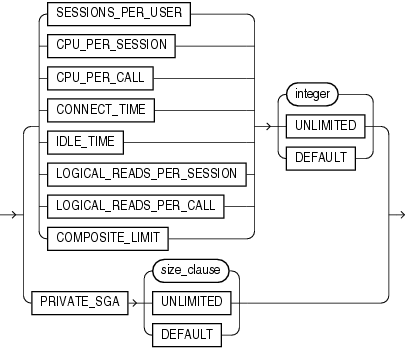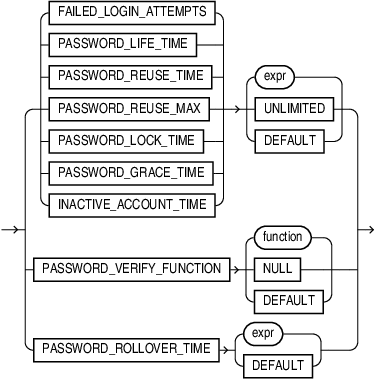ALTER PROFILE
Purpose
Use the ALTER PROFILE statement to add, modify, or remove a resource limit or password management parameter in a profile.
Changes made to a profile with an ALTER PROFILE statement affect users only in their subsequent sessions, not in their current sessions.
See Also:
CREATE PROFILE for information on creating a profile
Prerequisites
You must have the ALTER PROFILE system privilege.
To specify the CONTAINER clause, you must be connected to a multitenant container database (CDB). To specify CONTAINER = ALL, the current container must be the root. To specify CONTAINER = CURRENT, the current container must be a pluggable database (PDB).
Syntax
alter_profile::=
Semantics
The keywords, parameters, and clauses in the ALTER PROFILE statement all have the same meaning as in the CREATE PROFILE statement.
You cannot remove a limit from the DEFAULT profile.
Refer to CREATE PROFILE and to the examples in the next section for more information.
Examples
Making a Password Unavailable: Example
The following statement makes the password of the new_profile profile (created in "Creating a Profile: Example") unavailable for reuse for 90 days:
ALTER PROFILE new_profile LIMIT PASSWORD_REUSE_TIME 90 PASSWORD_REUSE_MAX UNLIMITED;
Setting Default Password Values: Example
The following statement defaults the PASSWORD_REUSE_TIME value of the app_user profile (created in "Setting Profile Resource Limits: Example") to its defined value in the DEFAULT profile:
ALTER PROFILE app_user LIMIT PASSWORD_REUSE_TIME DEFAULT PASSWORD_REUSE_MAX UNLIMITED;
Limiting Login Attempts and Password Lock Time: Example
The following statement alters profile app_user with FAILED_LOGIN_ATTEMPTS set to 5 and PASSWORD_LOCK_TIME set to 1:
ALTER PROFILE app_user LIMIT FAILED_LOGIN_ATTEMPTS 5 PASSWORD_LOCK_TIME 1;
This statement causes any user account to which the app_user profile is assigned to become locked for one day after five consecutive unsuccessful login attempts.
Changing Password Lifetime and Grace Period: Example
The following statement modifies the profile app_user2 PASSWORD_LIFE_TIME to 90 days and PASSWORD_GRACE_TIME to 5 days:
ALTER PROFILE app_user2 LIMIT PASSWORD_LIFE_TIME 90 PASSWORD_GRACE_TIME 5;
Limiting Account Inactivity: Example
The following statement modifies the profile app_user2 INACTIVE_ACCOUNT_TIME to 30 consecutive days:
ALTER PROFILE app_user2 LIMIT INACTIVE_ACCOUNT_TIME 30;
If the account has already been inactive for a certain number of days, then those days count toward the new 30 day limit.
Limiting Concurrent Sessions: Example
This statement defines a new limit of 5 concurrent sessions for the app_user profile:
ALTER PROFILE app_user LIMIT SESSIONS_PER_USER 5;
If the app_user profile does not currently define a limit for SESSIONS_PER_USER, then the preceding statement adds the limit of 5 to the profile. If the profile already defines a limit, then the preceding statement redefines it to 5. Any user assigned the app_user profile is subsequently limited to 5 concurrent sessions.
Removing Profile Limits: Example
This statement removes the IDLE_TIME limit from the app_user profile:
ALTER PROFILE app_user LIMIT IDLE_TIME DEFAULT;
Any user assigned the app_user profile is subject in their subsequent sessions to the IDLE_TIME limit defined in the DEFAULT profile.
Limiting Profile Idle Time: Example
This statement defines a limit of 2 minutes of idle time for the DEFAULT profile:
ALTER PROFILE default LIMIT IDLE_TIME 2;
This IDLE_TIME limit applies to these users:
-
Users who are not explicitly assigned any profile
-
Users who are explicitly assigned a profile that does not define an
IDLE_TIMElimit
This statement defines unlimited idle time for the app_user2 profile:
ALTER PROFILE app_user2 LIMIT IDLE_TIME UNLIMITED;
Any user assigned the app_user2 profile is subsequently permitted unlimited idle time.
Enable Gradual Password Rollover: Example
This statement sets the password rollover time to 2 days in the profile usr_prof:
ALTER PROFILE usr_prof LIMIT PASSWORD_ROLLOVER_TIME 2 ;


